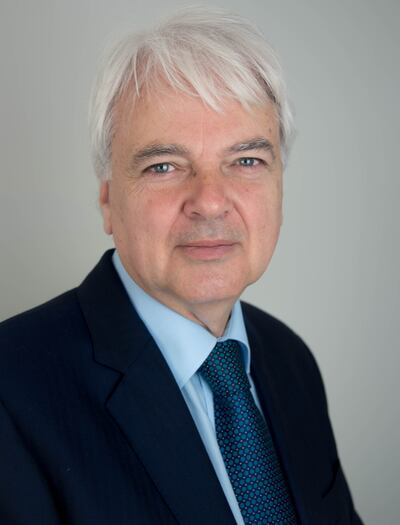Business rather than “fractured” geopolitics offers a path to solutions for the world’s biggest problems including climate change and trade wars, according to the chief executive of the London Chamber of Commerce and Industry.
Compared to a fragmentation of politics, business is genuinely “worldwide” in scale, said Richard Burge, a veteran chief executive in both the private and public sectors, who took on the lead role at the independent business network in February 2020. The LCCI has been lobbying for its members since it was founded in the City of London in 1881.
“Business is now on such a scale – taken in its broadest definition – and is so genuinely worldwide and is so genuinely interlinked in the way that geopolitics is not. That actually it is only business which is going to be able to sort all this out,” Mr Burge said during an interview with The National in Abu Dhabi.
Driving his optimism about what business can do is his belief that there is “a real sea-change coming”.
“Increasingly, businesses are realising that the old Milton Friedman model of, you know, just make profit … is not the way it's going.”
However, challenges remain as the world economy emerges from the impact of the Covid-19 pandemic.
Businesses are concerned about the spectre of rising inflation and the current blockages in supply chains, said Mr Burge, who also has considerable experience in the Middle East and Africa from his time with the UK Foreign and Commonwealth Office.
There is also concern about rising non-tariff barriers to trade.
"It's getting more complicated to trade, despite the fact our technology should enable us … to do this much more simply but so I think Chambers as a community have got to take on a much sharper leadership [role]. And I think our leadership should be about being innovative, being risk-takers … we have to be more accepting of the risks and consequences of risk in order to become more resilient."
Mr Burge was in the UAE ahead of the World Chambers Congress, which begins on Tuesday in Dubai.

He will be there together with Shevaun Haviland, director general of the British Chambers of Commerce, representing UK ambitions for global co-operation and to discuss how chamber networks can contribute to the growth and evolution of business today.
“I'm going to go out around the world and find 30 global international cities, I'm going to ask, 'can we work together?' Because we actually have more in common than we do with our own countries,” said Mr Burge.
The nature of how fractured the world is has led to trade deals becoming overwhelmingly dominated by bilateral agreements “which is not ideal”, he said.
“We spent 20 years trying to negotiate Doha [round of WTO trade talks]. The great successor to the Uruguay Round. It didn't happen. In that time, nearly 200 bilateral trade agreements were signed around the world,” said Mr Burge.
The WTO should now be focused on making sure such bilateral agreements share some features with global trade deals, he said.
chief executive of the London Chamber of Commerce and Industry
“Perhaps the WTO should actually be choosing a format or template for bilateral agreements … the other one is global standards and … global recognition of qualifications … get those right [and] you can cope with bilateral trade deals.”
The wider issue with a rising number of bilateral deals is that they are in nature transactional, which is in line with the direction in which politics has gone in recent years, said Mr Burge.
“The Chinese are becoming very transactional. And I think some of that is driven by internal concerns about the nature of economic growth and stability … for the Russian government, trade ... is purely a tool in the locker of geopolitics … with America, while I suppose the global trading community thought, ‘Well, [Donald] Trump's gone, things, we won't be so transactional’ … we forgot that the Democrats are not great globalisers and are very strong about 'America first' and jobs … that leaves precious few of us who are still genuinely committed to global enterprise and global trade.”


